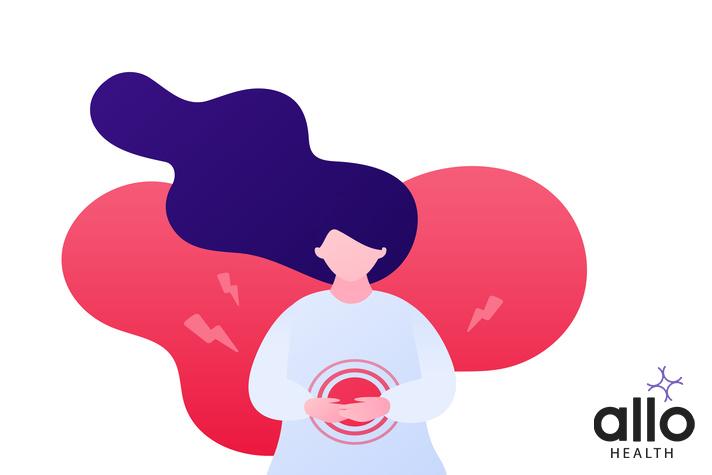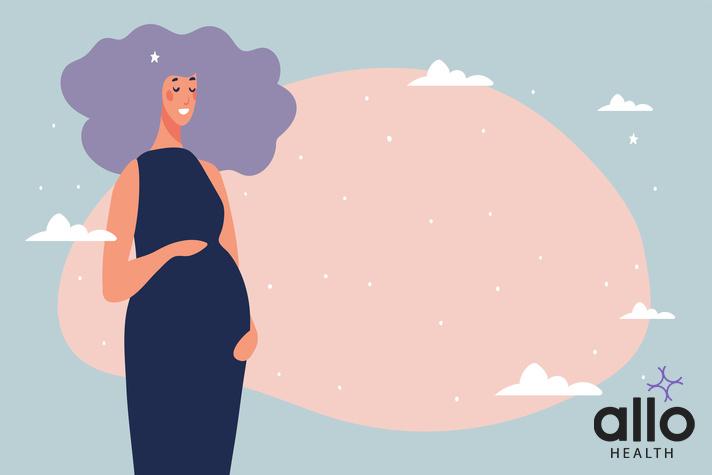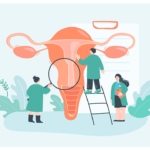Pregnancy With Vaginismus: Is It Possible?

Allo Health is dedicated to personalized well-being, offering support and trusted information tailored to individual health goals. The platform emphasizes human-generated content, led by a distinguished medical team of experts, including physicians and sexual health specialists. Their commitment to credibility involves rigorous fact-checking, authoritative research, and continuous updates to ensure accurate, up-to-date information. Allo Health's unique approach goes beyond conventional platforms, providing expert-led insights and a continuous commitment to excellence, with user feedback playing a crucial role in shaping the platform's authoritative voice.

Dr. Warisha holds an MBBS degree from GMERS Medical College, Ahmedabad. She has an in depth experience on sexual and reproductive health and rights.
Why This Was Upated?
Our experts continually monitor the health and wellness space, and we update our articles when new information became available.
Updated on 19 June, 2024
- Article was updated as part of our commitment to diversity, equity, and inclusion.

"The following blog article provides general information and insights on various topics. However, it is important to note that the information presented is not intended as professional advice in any specific field or area. The content of this blog is for general educational and informational purposes only.
Book consultation
The content should not be interpreted as endorsement, recommendation, or guarantee of any product, service, or information mentioned. Readers are solely responsible for the decisions and actions they take based on the information provided in this blog. It is essential to exercise individual judgment, critical thinking, and personal responsibility when applying or implementing any information or suggestions discussed in the blog."
Vaginismus is a condition that affects millions of women around the world. In its simplest definition, it is the involuntary contraction of the vaginal muscles that makes penetration impossible or painful. Unfortunately, it is also one of the most misunderstood conditions out there, with countless myths and misperceptions surrounding it. That is why it is so important to understand what vaginismus is, how it affects women, and its impact on pregnancy.
What Is Vaginismus?
Vaginismus is a medical and psychological condition that primarily affects individuals with vaginas, making vaginal penetration, such as sexual intercourse or the insertion of tampons, medical instruments, or a speculum during a pelvic exam, extremely painful or even impossible. This condition is often characterized by involuntary muscle contractions in the pelvic floor muscles that surround the vaginal opening, making it difficult for anything to enter the vagina.
Here’s a more detailed explanation of vaginismus:
- Causes:
- Psychological Factors: Vaginismus is often rooted in psychological factors, such as fear, anxiety, or past traumatic experiences related to sex or vaginal penetration. These psychological factors can lead to a conditioned response where the body involuntarily tenses up when penetration is attempted.
- Physical Factors: In some cases, physical factors like infections, injuries, or certain medical conditions affecting the genital area can contribute to vaginismus, though it is typically the result of a combination of physical and psychological factors.
- Symptoms:
- The primary symptom of vaginismus is pain or discomfort during attempts at vaginal penetration, which can range from mild discomfort to severe pain.
- Some individuals with vaginismus may also experience muscle spasms or a complete closure of the vaginal opening.
- It can significantly impact a person’s sexual and emotional well-being, leading to relationship difficulties and anxiety.
- Types:
- Primary Vaginismus: This occurs when a person has never been able to engage in vaginal penetration, often from the beginning of their sexual activity.
- Secondary Vaginismus: In this case, a person who was previously able to have pain-free vaginal penetration develops vaginismus later in life. This may be triggered by various factors, including trauma or an infection.
- Diagnosis:
- A healthcare provider, often a gynecologist or sexual health specialist, can diagnose vaginismus through a physical examination and a discussion of the patient’s medical history and sexual experiences.
- Diagnosis may also involve ruling out other physical conditions that could cause similar symptoms.
- Treatment:
- Psychotherapy: Cognitive-behavioral therapy (CBT) and other forms of talk therapy can be highly effective in treating vaginismus, especially when the underlying causes are psychological. Therapy can help individuals address their fears, anxieties, and any past trauma.
- Pelvic Floor Physical Therapy: This type of therapy involves working with a specialized physical therapist to learn relaxation techniques and exercises that can help control and relax the pelvic floor muscles.
- Education and Communication: Education about sexual anatomy, arousal, and lubrication, as well as open communication with a partner, can also be crucial in managing vaginismus.
- Outlook:
- With appropriate treatment, many individuals with vaginismus can experience significant improvement in their symptoms and go on to have satisfying and pain-free sexual experiences.
- It’s important to seek help from healthcare professionals who are experienced in treating sexual health concerns to address vaginismus effectively.
Vaginismus is a treatable condition, and individuals experiencing it should not hesitate to seek help and support from qualified healthcare providers and therapists to improve their quality of life and sexual well-being. It’s important to remember that this condition is not the fault of the person experiencing it, and seeking help is a positive step toward resolving the concern.
How Does Vaginismus Affect The Reproductive System?
Vaginismus primarily affects the sexual and emotional aspects of an individual’s life, but it can indirectly impact the reproductive system. Here’s a detailed explanation of how vaginismus can affect the reproductive system:
- Difficulty with Penetrative Sex: Vaginismus often makes vaginal penetration extremely painful or impossible. This can have a direct impact on an individual’s ability to engage in sexual intercourse, including attempts at conception. If vaginal penetration is required for conception (as in the case of heterosexual couples trying to conceive naturally), vaginismus can present a significant barrier.
- Delay in Seeking Medical Care: Some individuals with vaginismus may delay seeking medical care, assuming that their condition will resolve on its own or because of embarrassment or shame associated with discussing sexual difficulties. This delay in seeking help can affect their reproductive health, especially if they are trying to conceive.
- Stress and Anxiety: Vaginismus can lead to significant emotional distress, including anxiety and frustration related to sexual intimacy. These psychological factors can contribute to sexual difficulties and may interfere with the desire to engage in sexual activity, including reproductive efforts.
- Relationship Strain: Vaginismus can strain romantic and sexual relationships due to the physical pain and emotional distress it causes. This strain can extend to reproductive goals, making it challenging for couples to navigate the emotional and physical aspects of trying to conceive.
- Infertility Concerns: In cases where vaginal penetration is required for conception, such as with timed intercourse or intrauterine insemination (IUI), vaginismus can complicate the process. If the condition is not addressed, it may lead to infertility concerns and hinder fertility treatments.
- Impact on Pelvic Health: The repeated muscle contractions associated with vaginismus can affect the overall health of the pelvic floor muscles. Over time, this may lead to muscle weakness or imbalance in the pelvic region, potentially contributing to other pelvic health concerns.
- Treatment Implications: When seeking fertility treatments like in vitro fertilization (IVF) or intra-cytoplasmic sperm injection (ICSI), vaginismus can impact the process of retrieving eggs or conducting certain procedures, as these often involve vaginal access. In such cases, healthcare providers may need to work closely with individuals to manage the physical and emotional aspects of the treatment.
While vaginismus can pose challenges to the reproductive system, it is a treatable condition. Seeking professional help, such as therapy, pelvic floor physical therapy, or medical interventions, can improve the symptoms of vaginismus and allow individuals to pursue their reproductive goals more comfortably.
Open communication between partners and emotional support can play a crucial role in addressing the emotional and relational aspects of vaginismus and its impact on fertility. Couples experiencing vaginismus-related challenges in their reproductive journey should consider consulting with healthcare providers and therapists who specialize in sexual health and fertility to develop a comprehensive and personalized treatment plan.
Vaginismus And Pregnancy
Vaginismus can present unique challenges for individuals who wish to become pregnant. While it doesn’t directly affect the ability to conceive, it can complicate various aspects of the reproductive journey. Here’s a detailed explanation of how vaginismus can impact pregnancy:
- Difficulty with Sexual Intercourse: Vaginismus is characterized by involuntary muscle contractions around the vaginal opening, making vaginal penetration painful or impossible. This can significantly affect the ability to engage in sexual intercourse, which is often essential for conception in heterosexual couples who are trying to conceive naturally.
- Impact on Timing: The inability to have pain-free intercourse can make it difficult for couples to time their sexual activity during the woman’s fertile window, which is necessary for conception.
- Emotional and Psychological Impact:
- Stress and Anxiety: Vaginismus can lead to stress and anxiety related to sexual intimacy. These emotions can interfere with the desire to engage in sexual activity, including attempts at conception, and can lead to decreased sexual satisfaction.
- Relationship Strain: The emotional strain caused by vaginismus can extend to the romantic relationship. Couples may experience frustration, disappointment, or feelings of inadequacy, which can affect their emotional connection and, in turn, their reproductive journey.
- Fertility Treatments:
- Impact on Assisted Reproductive Technologies (ART): For couples seeking fertility treatments like in vitro fertilization (IVF) or intrauterine insemination (IUI), vaginismus can present challenges during the egg retrieval process or other procedures that require vaginal access.
- Preparation for Treatments: Individuals with vaginismus may need additional support and preparation to undergo fertility treatments, including emotional and physical guidance to manage the potential discomfort and anxiety associated with these procedures.
- Pelvic Floor Health:
- Muscle Tone and Reproductive Organs: The repeated muscle contractions associated with vaginismus can affect the overall health of the pelvic floor muscles. While this may not directly impact fertility, it can contribute to muscle weakness or imbalances in the pelvic region, potentially affecting comfort during pregnancy and childbirth.
- Prenatal Care and Childbirth:
- Pelvic Examinations: Routine prenatal care involves pelvic examinations to monitor the progress of pregnancy. For individuals with vaginismus, these exams can be uncomfortable or even painful. It’s essential to communicate with healthcare providers about the condition to ensure that examinations are conducted as comfortably as possible.
- Childbirth: Vaginismus may lead to concerns about childbirth, as the anticipation of pain during vaginal delivery can be distressing. It’s crucial to discuss these concerns with healthcare providers, who can offer guidance and support for managing pain and anxiety during labor and delivery.
- Treatment Options:
- Individuals with vaginismus who wish to become pregnant should seek treatment and support from healthcare providers experienced in sexual health and reproductive medicine. Treatment options may include therapy, pelvic floor physical therapy, and medical interventions to address the physical and psychological aspects of vaginismus.
- Communication and Support:
- Open communication between partners is essential. Couples should discuss their feelings, concerns, and goals related to pregnancy and seek emotional support and understanding from one another.
Can You Become Pregnant With Vaginismus?
Yes, it is possible to become pregnant if you have vaginismus, but there are unique challenges and considerations that individuals with vaginismus may encounter when trying to conceive. Here’s a detailed explanation:
- Natural Conception:
- Challenges: Vaginismus, characterized by involuntary muscle contractions around the vaginal opening, can make vaginal penetration painful or impossible. This can pose significant challenges for heterosexual couples who are trying to conceive through natural intercourse. Pain and discomfort during intercourse may reduce the frequency of attempts at conception during the fertile window.
- Timing: Couples may find it difficult to time their sexual activity appropriately to align with the woman’s fertile period, potentially leading to delays in conception.
- Emotional Impact:
- Stress and Anxiety: Vaginismus often leads to stress and anxiety related to sexual intimacy. These emotions can affect the desire to engage in sexual activity, including attempts at conception. Stress and anxiety may also impact sexual satisfaction, potentially adding emotional strain to the process of trying to conceive.
- Relationship Dynamics: The emotional strain caused by vaginismus can extend to the romantic relationship, potentially affecting emotional intimacy and communication between partners.
- Fertility Treatments:
- Assisted Reproductive Technologies (ART): For individuals or couples seeking fertility treatments such as in vitro fertilization (IVF) or intrauterine insemination (IUI), vaginismus can pose challenges during procedures that require vaginal access. Specialized care and support may be necessary to ensure that these treatments can be performed comfortably and effectively.
- Pelvic Floor Health:
- Impact on Pregnancy and Childbirth: While vaginismus itself doesn’t directly affect fertility, the repeated muscle contractions associated with this condition can impact the overall health of the pelvic floor muscles. This may not affect the ability to conceive but could have implications for comfort during pregnancy and childbirth.
- Treatment Options:
- Individuals with vaginismus who wish to conceive should consider seeking treatment and support from healthcare providers experienced in sexual health and reproductive medicine. Treatment options may include therapy (both individual and couples therapy), pelvic floor physical therapy, and medical interventions to address the physical and psychological aspects of vaginismus.
- Communication and Support:
- Open and honest communication between partners is crucial. Couples should discuss their feelings, concerns, and goals related to pregnancy and seek emotional support and understanding from one another.
- Seeking support from a therapist or counselor who specializes in sexual health can help individuals and couples navigate the emotional aspects of vaginismus and the challenges it may pose during the conception process.
Can The Delivery Process Hurt For Those With Vaginismus?
For individuals with vaginismus, the delivery process, specifically vaginal childbirth, can indeed be a source of concern and discomfort. Vaginismus is a condition characterized by involuntary muscle contractions around the vaginal opening, leading to pain and difficulty with vaginal penetration. Here’s a more detailed and SEO-optimized explanation of how the delivery process can be affected for those with vaginismus:
Impact of Vaginismus on Vaginal Childbirth:
- Increased Pain and Discomfort: Vaginismus can intensify the discomfort and pain experienced during vaginal childbirth. The involuntary muscle contractions associated with vaginismus can make the process of the baby passing through the birth canal more painful.
- Anxiety and Fear: Individuals with vaginismus often experience heightened anxiety and fear related to vaginal penetration. These emotional factors can be exacerbated during childbirth, potentially making the experience more distressing.
- Need for Adequate Support: It’s crucial for individuals with vaginismus to have a supportive healthcare team that is aware of their condition. Proper communication with healthcare providers can help ensure that the birthing process is as comfortable as possible.
- Prenatal Preparation: Seeking prenatal care and discussing vaginismus with healthcare providers during pregnancy is essential. They can offer guidance on pain management options, such as epidurals, and provide emotional support.
- Alternative Delivery Options: In some cases, individuals with severe vaginismus may opt for alternative delivery methods, such as cesarean section (C-section). This decision should be made in consultation with healthcare professionals and should consider the individual’s specific circumstances.
Frequently Asked Questions
(1) Can you get pregnant if you have vaginismus?
Yes, it is possible to become pregnant with vaginismus. While the condition may make intercourse difficult, seeking treatment and open communication with your partner can help you navigate the journey to parenthood.
(2) Does vaginismus affect fertility?
Vaginismus itself doesn’t directly impact fertility. It can make natural conception more challenging due to pain during intercourse.
(3) How can I manage vaginismus when trying to conceive naturally?
To manage vaginismus during attempts at natural conception, consider seeking treatment, including therapy and pelvic floor exercises. Effective communication with your partner is essential for emotional support.
(4) Can vaginismus impact fertility treatments like IVF or IUI?
Yes, vaginismus can affect fertility treatments requiring vaginal access. Inform your healthcare providers about your condition so they can tailor procedures to your comfort.
(5) What if I find pelvic exams during pregnancy uncomfortable due to vaginismus?
If you experience discomfort during prenatal exams due to vaginismus, inform your healthcare provider. They can offer guidance and support to minimize discomfort.
(6) Is vaginismus linked to concerns during childbirth?
Vaginismus itself doesn’t cause childbirth concerns, but it may lead to concerns about pain during delivery. Discuss these concerns with your healthcare team to plan for a comfortable birth experience.
(7) Should I disclose my vaginismus to my fertility specialist?
Yes, it’s important to inform your fertility specialist about your vaginismus. They can tailor treatments and procedures to your needs, ensuring your comfort and success.
(8) Can vaginismus be treated during pregnancy?
Yes, vaginismus can be treated during pregnancy. Seek guidance from a healthcare provider experienced in treating sexual health concerns for appropriate treatment options.
(9) What if my partner feels frustrated or inadequate due to vaginismus?
Encourage open communication with your partner about your feelings and concerns. Couples therapy can help address emotional aspects and strengthen your relationship.
(10) Are there alternative ways to conceive if vaginismus is too challenging?
Yes, if vaginismus makes natural conception too challenging, consider alternative methods like donor insemination or surrogacy. Discuss these options with a fertility specialist to determine the best fit for your situation.






































